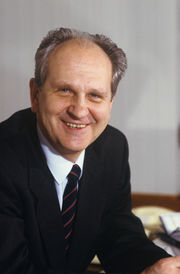Top Qs
Timeline
Chat
Perspective
Boris Pugo
Soviet Latvian politician (1937–1991) From Wikipedia, the free encyclopedia
Remove ads
Boris Karlovich Pugo (Latvian: Boriss Pugo, Russian: Борис Карлович Пуго; 19 February 1937 – 22 August 1991) was a Soviet communist politician of Latvian origin.
You can help expand this article with text translated from the corresponding article in Russian. (August 2022) Click [show] for important translation instructions.
|
Remove ads
Early life and education
Pugo was born in Kalinin, Russian SFSR (now Tver, Russia) into a family of Latvian communists. They had left Latvia after Latvia was proclaimed an independent country in 1918, and the Communist side was defeated in the war that followed. His father, Karl Janovich Pugo, was a participant in the October Revolution and the Civil War as a member of the Latvian Riflemen. His family returned to Latvia after the Soviet Union occupied and annexed it in 1940.[1]
Pugo graduated from Riga Polytechnical Institute in 1960 and worked in various Komsomol, Communist Party and Soviet government positions, both in Latvia and Moscow.
Remove ads
Party career
Pugo served in various positions between 1960 and 1984 including the first secretary of the Central Committee of the Komsomol of the Latvian SSR, a secretary of the Central Committee of Komsomol of the USSR, the First Secretary of the Riga City Committee of the Communist Party and chairman of the KGB in Latvia.
Pugo was the first secretary of the Communist Party of Latvia from 14 April 1984 to 4 October 1989. Pugo also served as chairman of the Central Control Commission of the Communist Party of the Soviet Union from 1989 to 1991.
Between 1990 and 1991, Pugo was the Minister of Interior Affairs of the USSR.
Remove ads
August coup and death
Pugo participated in the August coup in 1991 and as the Minister of the Interior firmly supported measures to suppress opposition to the coup. After the coup had failed, Pugo died by suicide, anticipating arrest.[2] He was contacted by the RSFSR prosecution for a meeting and he shot himself minutes after the phone call.[2] His wife Valentina Ivanovna also died by suicide,[3] although sources from the time were uncertain as to whether she killed herself or was killed by her husband.[2][4][5][6]
References
External links
Wikiwand - on
Seamless Wikipedia browsing. On steroids.
Remove ads

